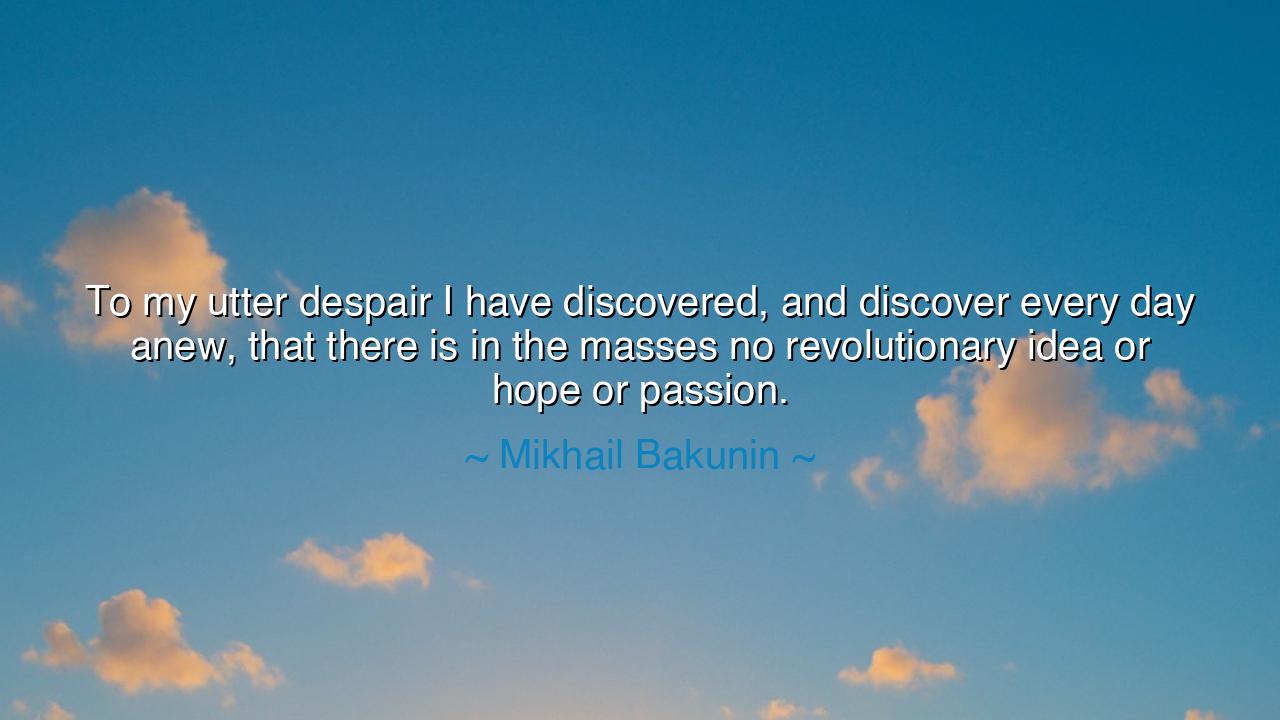
To my utter despair I have discovered, and discover every day
To my utter despair I have discovered, and discover every day anew, that there is in the masses no revolutionary idea or hope or passion.






“To my utter despair I have discovered, and discover every day anew, that there is in the masses no revolutionary idea or hope or passion.” Thus lamented Mikhail Bakunin, the fiery spirit of nineteenth-century revolution, whose life was consumed by the dream of freedom and the struggle against oppression. In this cry of anguish, we hear not merely the voice of a man, but the sigh of an age—a soul that had given itself to the cause of liberation, only to find the people themselves unwilling to rise. His words are not cold analysis but the grief of one who has loved humanity too deeply, and who has come to see that the chains of the human spirit are often forged not by tyrants alone, but by the indifference of the enslaved.
The origin of this quote lies in Bakunin’s reflections during the failures of revolutionary uprisings in Europe, particularly after the revolutions of 1848 and the suppression of early socialist movements. He had believed, with the fervor of prophecy, that once the people were shown the truth of their oppression, they would rise in revolutionary passion, tear down the thrones of kings, and build a society founded upon equality and brotherhood. Yet as the years passed, he saw apathy where he had expected fire, obedience where he had hoped for courage. In his despair, he confessed that the masses, though suffering beneath the weight of power, often lacked the will to overthrow it. They had grown accustomed to their chains, mistaking survival for freedom.
Bakunin’s lament is one that echoes through the corridors of history. Many before him had believed that the people, once awakened, would reclaim their dignity—but the awakening seldom came. Spartacus, who led the slaves of Rome in rebellion, discovered that for every man who rose with him, ten more chose the comfort of submission. Giordano Bruno, who preached the freedom of thought, was burned alive while the crowds watched in silence. Even the French Revolution, born in fire and vision, eventually gave way to empire and order. Again and again, those who sought to liberate mankind found themselves betrayed not by their enemies, but by the passivity of those they longed to save.
This truth, though bitter, reveals the tragic complexity of human nature. The chains that bind us are not always visible; they are woven into the habits of fear, obedience, and resignation. The rulers of the world have always understood that power does not endure through violence alone, but through the quiet acceptance of the ruled. When Bakunin spoke of the absence of “revolutionary hope or passion,” he was naming this spiritual paralysis—the way in which suffering, when prolonged, can numb the very desire for freedom. To those in bondage, freedom can come to seem like a dream too dangerous to chase, and so they learn to love their prison walls.
Yet, Bakunin’s despair also carries within it a warning and a call. His disappointment does not mean the cause of liberty is lost, but that it must be reimagined. The revolution he sought was not only political—it was moral, spiritual, and personal. True change, he came to see, cannot be forced from above or ignited by the few alone. It must arise from within the hearts of the many. The masses, as he called them, must first be taught to see themselves not as victims but as agents of destiny. A revolution of weapons may win a day, but a revolution of consciousness wins the centuries.
Consider, for example, the story of Mahatma Gandhi, who led his people not through violence, but through the awakening of moral courage. He understood what Bakunin despaired to find—that the true strength of a people lies not in their rage, but in their realization of worth. Gandhi transformed submission into discipline, despair into resolve, and fear into faith. His revolution began in silence and prayer, yet it moved an empire. In him, Bakunin’s failed hope found a distant fulfillment—the discovery that passion for justice must be taught, nurtured, and lived, not merely demanded.
So, my friends, let Bakunin’s sorrow be to us a source of wisdom. Do not wait for the masses to awaken—be among those who awaken them. Do not curse the apathy of the world; pierce it with the light of example. If you believe in justice, live it. If you dream of freedom, embody it. For hope is not a gift of circumstance, but a fire passed from one soul to another. The revolution he sought is not of blood and barricades, but of hearts and minds. And though Bakunin himself may have died disillusioned, his cry still stirs the conscience of those who refuse to surrender to despair.
For in the end, his words are not only a lament—they are a mirror held before every generation. When you look upon the world and find it sleeping, do not lose faith. The awakening begins in you. Be the one who dares to hope when others are silent, the one who believes when others have forgotten how. For as long as even a single heart still burns with revolutionary passion, the story of freedom is not over—it is merely waiting to be told anew.






AAdministratorAdministrator
Welcome, honored guests. Please leave a comment, we will respond soon